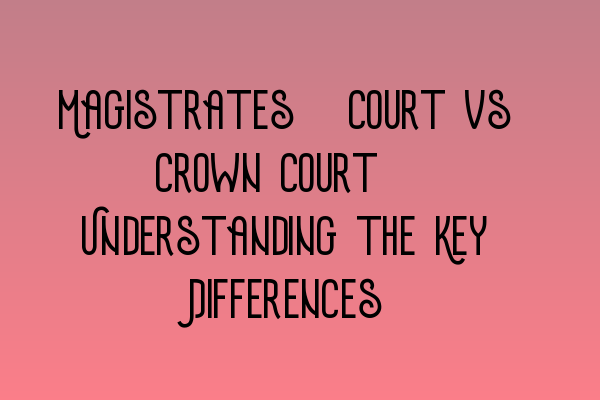Magistrates’ Court vs Crown Court: Understanding the Key Differences
Welcome to the SQE Criminal Law & Practice Law UK blog! In today’s post, we will explore the key differences between Magistrates’ Court and Crown Court. As a solicitor, it is essential to understand the nuances of these two courts to provide the best legal representation to your clients.
1. Jurisdiction and Authority
Magistrates’ Court is the lower court and deals with less serious criminal cases, such as traffic offenses, minor thefts, and public order offenses. On the other hand, Crown Court handles more serious criminal cases, including murder, rape, robbery, and drug offenses. The Crown Court has the authority to impose longer sentences and has jurisdiction over both indictable offenses and cases committed in indictable mode.
If you are preparing for the SQE 1 exam, make sure to practice exam questions related to the jurisdiction of Magistrates’ Court and Crown Court. You can find valuable practice questions here.
2. Trial Procedure
Another significant difference lies in the trial procedure followed by each court. In Magistrates’ Court, trials are conducted without a jury, typically with a single magistrate or a bench of lay magistrates presiding over the case. Crown Court, on the other hand, holds trials with a judge and a jury. The jury consists of twelve randomly selected members of the public who play a crucial role in determining the defendant’s guilt or innocence.
If you are looking for SQE 1 practice mocks to familiarize yourself with the trial procedure in both Magistrates’ Court and Crown Court, check out our mock exams FLK1 and FLK2.
3. Sentencing Powers
The sentencing powers of Magistrates’ Court and Crown Court also differ significantly. Magistrates’ Court can impose a maximum sentence of up to six months in prison or a fine of up to £5,000 per offense. In contrast, Crown Court has unlimited sentencing powers and can impose longer custodial sentences, including life imprisonment.
For aspiring solicitors preparing for the SQE 2 exam, it is crucial to thoroughly understand the sentencing powers of different courts. Explore our SQE 2 preparation courses here to enhance your knowledge on criminal law and procedure.
4. Appeals Process
Both Magistrates’ Court and Crown Court have provisions for appeals. In Magistrates’ Court, appeals usually go to the Crown Court, where the case is retried. On the other hand, appeals from Crown Court are typically heard in the Court of Appeal.
Conclusion
Understanding the key differences between Magistrates’ Court and Crown Court is crucial for every solicitor specializing in criminal law. Familiarizing yourself with the jurisdiction, trial procedure, sentencing powers, and appeals process of each court will enable you to provide the best legal representation to your clients.
If you are preparing for the SQE 1 or SQE 2 exams, we offer comprehensive preparation courses to help you succeed. Check out our SQE 1 preparation courses here and find the upcoming SRA SQE exam dates here.
Stay tuned for more informative articles on SQE Criminal Law & Practice Law UK blog. Knowledge is power!
